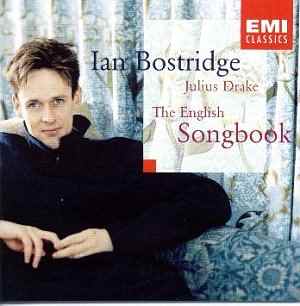
Stanford: La Belle Dame Sans Merci
Gurney: Sleep; I will go with my father a-ploughing
Dunhill: The Cloths of Heaven
W.D. Browne: To Gratiana Dancing and Singing
Somervell: To Lucasta, on going to the Wars
Delius: Twilight Fancies
German: Orpheus with his lute
Warlock: Jillian of Berry; Cradle Song; Rest, sweet Nymphs
Finzi: The Dance continued ('Regret not me'); Since we loved
Vaughan Williams: Linden Lea; Silent Noon
Parry: No longer mourn for me
Quilter: Come away, death, Now sleeps the Crimson Petal
Grainger: Bold William Taylor; Brigg Fair
Anon: The Death of Queen Jane; The Little Turtle Dove
Old Irish Air (arr. By Stanford): My love's an arbutus.
A glance at the above list confirms that this album is comprised of many
well-known and favourite songs from the English Songbook plus a few that
might be less familiar. The point is, though, that they are delivered by
an artist of extreme sensitivity and polish, and one who has a most impressive
technique and pleasing timbre of voice.
There are some gaps in this repertoire that will disappoint, notably no songs
by Walton or John Ireland, but perhaps a second volume is planned on the
success of this present album?
I was particularly drawn to Bostridge's expressive singing of the opening
song, Stanford's setting of John Keats' 'La Belle Dame Sans Merci.' Bostridge
plays on his audience's anticipations and emotions stretching out the tension,
colouring his voice according to the narrative, doleful as he describes the
Knight-at-arms pallor and eagerly ardent as the hero falls under the spell
of the 'fairy's child' and grisly as he realises that he has been duped and
sees the - 'kings and princes too, Pale warriors, death pale were they
all…' He is equally persuasive in Percy Grainger's Bold William Taylor,
interestingly supple of line, and not hesitating to emphasis words like 'Bold'
for dramatic effect.
His acute sense of line and harmony is evident in the gorgeous Quilter songs
and I cannot remember hearing more affecting singing of 'Now Sleeps the Crimson
Petal', nor for that matter, of 'Come Away, Death.' Bostridge's elegance
and eloquence is ideal for these songs. Where it is not so apt is in songs
with more earthy subjects like Gurney's 'I will go with my father a-ploughing'
for Bostridge sounds as though he is born to the pen not the plough. But
the other Gurney song, 'Sleep' with its gently rocking piano motifs and
Bostridge's long-held chords and decorated figures arching over, is sheer
bliss.
I would also just mention one or two other songs. The gently, plaintive pleading
of Dunhill's 'The Cloths of Heaven' (after W.B. Yeats); Delius's 'Twilight
Fancies' with singer and pianist ironically commenting on the (spoilt?) maiden's
prevarication ('What is it I long for?'); and Vaughan Williams' lovely pastoral
evocation, 'Linden Lea' and the heart-stopping, limpid beauty of his 'Silent
Noon.'
Julius Drake contributes consistently thoughtful and insightful accompaniments.
An album which will be paying repeat visits to my CD player
Reviewer
Ian Lace


